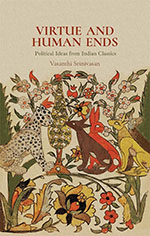Studies abound of Arthashastra, Mudrarakshasa, Panchatantra and Hitopadesha; not so many of Dasakumaracarita, Vetala Panchavimshati and Simhasana Dvatrimshika (2nd century BCE to 13th century CE). Srinivasan is the first to study them together vis-à-vis western political thought. It is the first study based upon Telegu translations which provide different versions of some tales.
Dasakumaracarita is unique for its unstinted praise for niti–shastra that is not found even in the Arthashastra. However, this is undercut by a parody mocking Kautilya’s tenets as too demanding and urging study of other disciplines because statecraft is uncertain, is the root of all anxiety, and a hindrance to pleasures like hunting, gambling, drinking and women which bolster manhood and enlarge the circle of friends. In Mudrarakshasa the king’s orders about a festival are countermanded by Chanakya. Both Panchatantra and Dasakumaracarita depict counsellors losing favour because kings suspected powerful ministers. Srinivasan mentions how Plato failed with Dionysus of Syracuse whereas Chanakya succeeded with Chandragupta. Realpolitik, however, is often found to support tyranny and sophistry.

